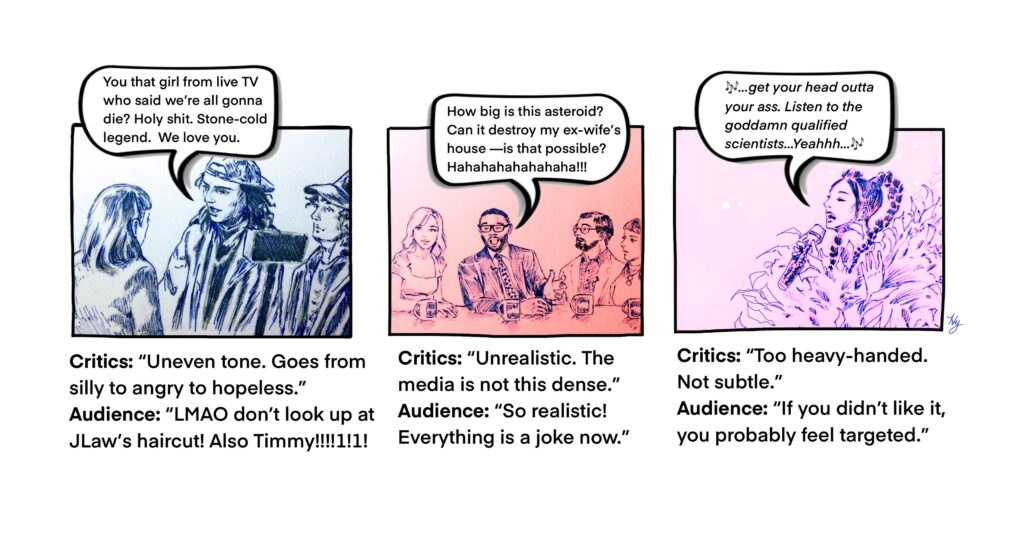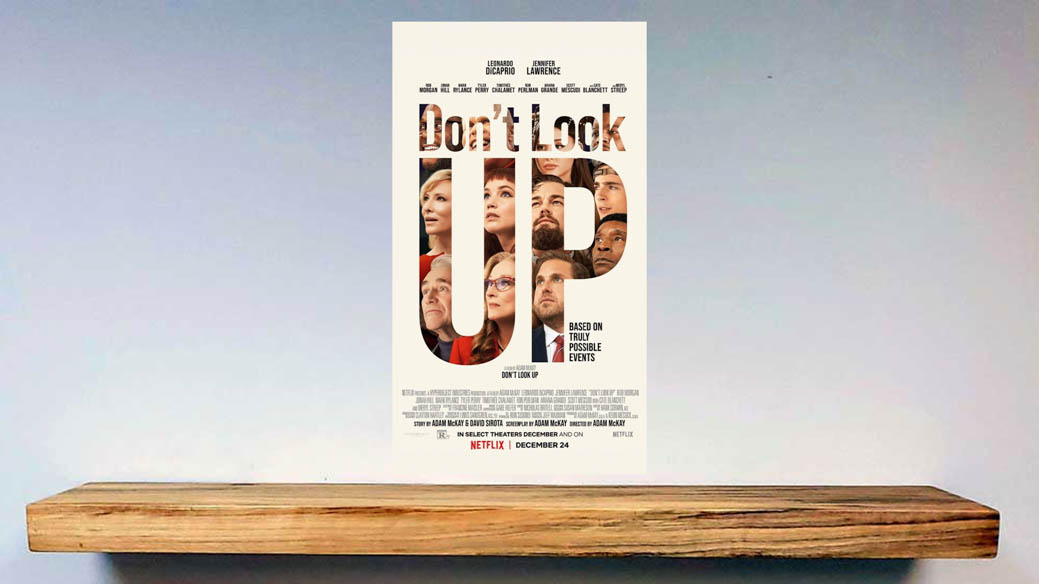Don’t Look Up, an allegory of the current climate crisis
Over politicization and capitalization of science leads to inaction and complacency in resolving a global crisis.
Spoiler warning: this article contains spoilers of the film.
The latest Netflix science-fiction movie Don’t Look Up, starring Leonardo Di Caprio and Jennifer Lawrence, is about the threat of a planet-killing comet headed toward Earth. Alarmed by the situation, astronomy professor Randell Mindy (played by Di Caprio), and Ph.D. candidate Kate Dibiasky (played by Lawrence), report this information to the U.S. president (played by Meryl Streep). The narcissistic and politically driven president decides to “sit tight and assess” the situation rather than take action, reflecting the apathy many people experience today when environmental issues are discussed.
The environmental and political satire in this movie is about the ongoing climate crisis in real life. Politicians neglect to enforce climate protection to an adequate degree. The climate crisis is worsening, and it has become a challenge to bring awareness to the severity of the situation.
In Don’t Look Up, the two main scientists continuously present their research, and are constantly ignored or shamed for not being more positive and “light.” The president only flip-flops in her decisions and action depending on which is more politically favorable. This applies to some egotistical world leaders that pose a threat to human life because they act on self-interest and refuse to tackle the climate crisis. Some world leaders refuse to believe that there is an ongoing climate crisis and say climate change is a hoax.
“A film about a comet hurtling towards Earth and no one is doing anything about it? Sounds exactly like the climate crisis,” argues climate scientist Peter Kalmus.
The butt of the joke in this film is the anti-science individuals and non-believers that refuse to acknowledge the scientific community. This also includes people who are immersed in capitalism and toxic political systems. These institutions get in the way of accepting science for the sake of public good, simply because the governmental parties want to twist it for individual gain.
The film exposes the individual, societal, and institutional levels of complacency and inaction that continue to worsen the climate crisis. The film shows how helpless people can be, no matter how much individual effort they dedicate to combatting the crisis, simply because the problem requires everyone to work together.
Unlike comet-ending movies like Armageddon, the comet actually does make impact and destroy the earth which kills everybody on it. The only ones that survive are the ultra-wealthy who manage to get on a Noah’s Arc type spaceship. After thousands of years in a cryo-chamber, they arrive on another earth-like planet to restart the human race. This shows that those with wealth and power are unaffected by destructive forces and will continue to seize whatever they can, regardless of the consequences.
There is one credit scene where the last man on earth says, “What’s up, y’all? I’m the last man on Earth,” before signing off with, “Don’t forget to like and subscribe.” The grim ending to the movie is a realistic depiction of what will actually happen if nothing is done. This final comment is a jab at popular social media trends of advocacy that aren’t substantial, and only blind people from the reality of the situation. It becomes an escape, but the movie argues that we can’t just escape it, we need to fight it head-on.
Don’t Look Up reflects ongoing issues such as the Covid-19 pandemic, climate change, populist world leaders, violence, and more. The director of this film, Adam Mckay, emphasizes the dangers of over-politicization and formulates the perfect political satire.
We are past the time to listen to scientists. The science and data are there, it is our responsibility to ensure it doesn’t go to waste, and that we take immediate action, as a human race.
Don’t Look Up — Volume 48, Issue 9

Associate Opinion Editor (Volume 48) — Haya Abu Ghosh is a fourth-year student double majoring in English and Political Science. When I am not doing any school work, I love going out with friends to coffee shops and dining in restaurants to socialize. My passions include but are not limited to reading, writing, sketching, binge-watching Netflix TV shows, taking pictures of nature and talking about politics (do not get me started talking about the Palestinian-Israeli conflict, Indigenous injustices, Uyghur Muslims in China and many more topics).


